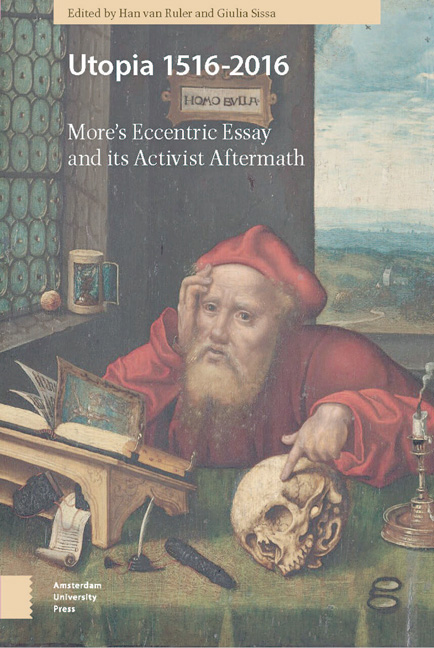Book contents
- Frontmatter
- Contents
- Introduction
- PART 1 THE BOOK
- A Praise of Pain: Thomas More’s Anti-utopianism
- Bodies, morals, and religion: Utopia and the Erasmian idea of Human Progress
- PART 2 ORIGINAL RECEPTION
- Realism Vs Utopianism: The Problem of the Prince in the Early-Modern Netherlands
- From Thomas More to Thomas Smith: Utopian and Anti-Utopian Understandings of Economic Change in Sixteenth-century England
- PART 3 PHILOSOPHICAL CRITICISM
- Reflections on the Utopian Mind
- Utopianism in Today’s Health Care
- PART 4 PHILOSOPHICAL ACCLAIM
- Utopianism and its Discontents: A Conceptual History
- The integrity of Exacerbated Ambiguity: More’s Utopia as an Evaluative Thought Experiment
- Index
Utopianism in Today’s Health Care
Published online by Cambridge University Press: 12 December 2020
- Frontmatter
- Contents
- Introduction
- PART 1 THE BOOK
- A Praise of Pain: Thomas More’s Anti-utopianism
- Bodies, morals, and religion: Utopia and the Erasmian idea of Human Progress
- PART 2 ORIGINAL RECEPTION
- Realism Vs Utopianism: The Problem of the Prince in the Early-Modern Netherlands
- From Thomas More to Thomas Smith: Utopian and Anti-Utopian Understandings of Economic Change in Sixteenth-century England
- PART 3 PHILOSOPHICAL CRITICISM
- Reflections on the Utopian Mind
- Utopianism in Today’s Health Care
- PART 4 PHILOSOPHICAL ACCLAIM
- Utopianism and its Discontents: A Conceptual History
- The integrity of Exacerbated Ambiguity: More’s Utopia as an Evaluative Thought Experiment
- Index
Summary
Les utopies apparaissent comme bien plus réalisables qu’on ne le croyait autrefois. Et nous nous trouvons actuellement devant une question bien autrement angoissante: Comment éviter leur réalisation définitive? […] Les utopies sont réalisables. La vie marche vers les utopies. Et peut-être un siècle nouveau commence-t-il, un siècle où les intellectuels et la classe cultivée rêveront aux moyens d’éviter les utopies et de retourner à une société non utopique moins “parfaite” et plus libre. (Nicolas Berdiaeff)
Abstract
Utopias are much more prone to realization than people would have thought possible, according to Berdiaeff. In the twentieth century, we have witnessed realized totalitarian utopias (such as the ‘really existing socialism’ in East Germany). In the twenty-first century, late modern, capitalist society seems well under way towards the construction of another kind of realized utopianism. Recent developments in today's health care system (changes in the very meaning of health and care, in medicine and nursing, and even in the ethics of care) all point in the same direction: the growing hold of the utopian mind (the expression is Kolnai’s) on crucial aspects of human life and society. Must we not agree with Berdiaeff that insight in the new ‘realized’ utopianism should induce us to dream ‘of a non-utopian society less “perfect”, but more free’?
Keywords: utopianism, realized utopia, health care, political correctness, Kolnai
Helping and appreciating
When we are suddenly confronted with someone else's accident or illness, we know what we have to do. We should help the person in need by administering first aid and/or call an ambulance. Unless we do that we fail to take proper care of the other. In a society like ours, help for people in need or in an emergency is organized through special services; and sickness and accident are usually covered by health- and accident insurance agencies. Different kinds of technical and organizational elements are involved in helping patients to return as soon as possible to a healthy and active life. This is a domain in which we undoubtedly can speak of real progress, not only in the technical-medical, but also in the organizational sense. It is sufficient to envisage the situation of only a few decades ago to realize this. Today, health care also encompasses prevention, care for the chronically and mentally ill, as well as for more or less helpless elderly people.
- Type
- Chapter
- Information
- Utopia 1516-2016More's Eccentric Essay and its Activist Aftermath, pp. 185 - 204Publisher: Amsterdam University PressPrint publication year: 2017

